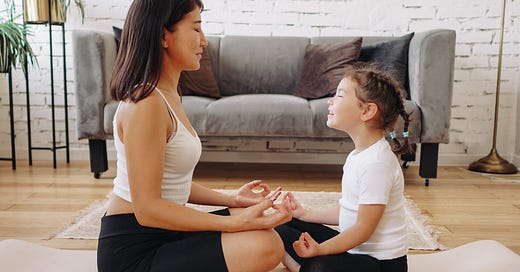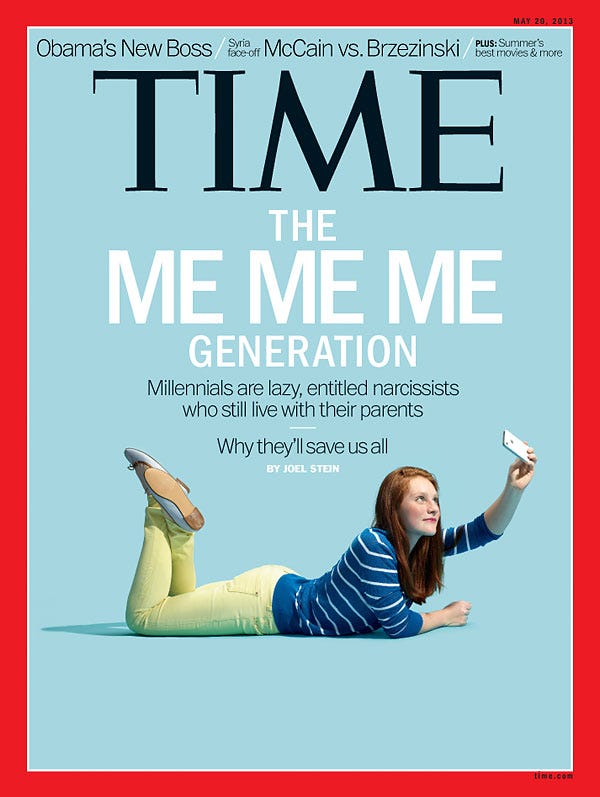Millennial Parents – Why are we the way we are?
This four-part series starts with all the things we were told.
Addressing the generation that raised us is, necessarily, where this series must begin.
If for some reason that’s you and you’re reading this, and you don’t like what it says, please consider why. Because, if you’re like so many of the commenters I see on posts that cover this topic, you don’t think it applies to you anyway… And if it doesn’t, it doesn’t. Great!
But something strange happened over the last handful of years. First, and to my chagrin, millennials stopped being the “young generation.” Actually, we became the parents. Yeah. Somehow the generation that annoyingly coined “adulting” did really become the adults in the room.
Through this life-changing shift, we’ve been given the opportunity to observe the world through a different lens. Social media allowed us to do it in scale. And that scale illuminated patterns that many of us, across many demographics, identified.
So it may be true that your adult son remembers his childhood wrong or that your daughter-in-law is a bitch. Maybe you really did “do your time” and it’s “your turn now” and you don’t “owe your daughter babysitting.”
But this series comes from our point of view. It’s an exploration of and a rumination on millennial parents – and it begins with the parenting and the messaging that we received in childhood.
This four-part series begins here; transitions into a breakdown of millennial parenting; explores mom guilt and the paradox of whether we can ever be “good enough”; and, last, introduces what I truly believe is the next level in parenting.
So here it is, Issue 8. Vol. I: Millennial Parents – Why are we the way we are?
Participation Ribbons
“Kids these days expect a prize just for showing up.”
This is often used to reinforce the idea that the world is, indeed, zero sum. Some people are winners, and some are just losers. Why sugar coat that?
So when it comes to these so-called participation ribbons, I’m of two minds.
On one hand, they weren’t even really for us. As a parent I now know how difficult it is to deal with your child’s disappointment. We want the best for them, of course. But if I’m being honest, there’s also the whining. The crying. The full-on meltdowns.
Maybe if we just give them this stupid little ribbon thing we won’t have to get down on our own knees, look them in the eyes and meet them at their feelings. We won’t have to press our chest into theirs – perhaps in a way we ourselves didn’t get – and help them to, despite our own discomfort, process it all.
On the other hand, why not just hand these ribbons out? Let’s acknowledge everyone for showing up and being part of their community (Especially the athletically-challenged children for whom relay competitions were terrifying. Hi, its me!). Does someone really have to lose for someone else to be a winner?
Life Isn’t Fair
Sure… But why couldn’t it be? Why did the unfairness have to start at home, where we should all feel safest, in the form of strange, punitive lessons?
Why were we constantly taught that our best bet in life was to roll over and accept the status quo?
I was teased a lot for being sensitive about animals or not wanting to eat meat. My “heightened” sense of justice was a punchline because that’s just “not how the world works”. I learned that my sensitivity was shameful.
Imagine if, instead, we taught our children to expect a different kind of world. A world that would begin by modelling that kind of respect to them while they simply existed in their purest, most innocent – and unempowered – form.
On Entitlement
Our generation was introduced to the world in a rather humiliating way.
I’m not sure if people were as fixated on “generations” before Millennials proved to be so damn effective at turning over highly editorialized commercial journalism… But before most of us could rent a car, we were gifted this unbecoming title:
Overnight we were characterized as selfish, petulant, and unwilling to work (I think this may have been a bit of an Archie Bunker effect thing). Literally anything we did that wasn’t what the older generation wanted, was deemed “entitled,” a tidy little assessment that left no room to be seen as individual or to be heard.
Anything that fell short of fostering that hierarchical feeling of dominance was characterized as a moral failing. No, worse. Rude. Attitude-y. Smart-mouthed. The assertion was that we should show an unquestioning respect because, well… Because.
“I put a roof over your head.”
As though feeding and housing one’s own child is optional. Sure, emotional support may have been. But those keep-you-alive basics? Nah, parents have always been on the hook for those.
So where does the desire to lord that over a child’s heads come from? Aside from being a brute way to assert dominance, I think, in part, it stems from the utter thanklessness that happens in parenting.
Let’s be clear: Those basics are not easy to provide. But children quite literally cannot fathom the value of a dollar, they’re hardwired to hold you hostage with their endless demands and, quite frankly, they didn’t ask for any of this.
What this ultimately comes down to is resentment. It feels like working to the brink of exhaustion to only check off the “adequate” box. Which begs the question of why these kinds of parents even had kids. What had they been hoping to get out of it?
That’s not to say it isn’t fair to want to be appreciated. But perhaps trying to force the basic functions of parenting onto a pedestal that creates a hierarchy where the helpless can be belittled for simply existing won’t earn the accolades one may have hoped for.
But we could maybe hand out a participation ribbon for their effort.
Training Wage
When I got my first job at 15, I learned that I wasn’t going to be paid what everyone else was paid. I was going to exert the exact same amount of effort. I was going to produce the same labour outcome. But I was going to get paid less for the first 500 hours of my energy.
When I complained, the response was swift. I was being myopic. I didn’t understand how things worked. This training wage was a good thing, making it easier for employers to allow people like me – those who have not yet proven our capitalistic value – to work.
Setting aside how privileged the assumption is that every teenager would just be working for extra pocket money, the message was clear: The powers-that-be inherently deserve special treatment, and the rest of us? Well, our labour is a great way to prove our worthiness.
The Female Form
Did you know that babies, I believe less than six months old or so, quite literally do not have a conception of being separate from their mother?
That’s kind of how I feel about the male gaze. The way it has percolated within every single moment of my life, especially in those crucial coming of age years (to be sure, this bullshit does not alone belong to millennials).
But for us, it was basically a Big Brother of a force. Ever present, but somehow insidious in that we didn’t realize we were openly embracing it.
There we were, often alongside our mothers, reading the gossip magazines as they explained how fat a 29-year-old Jessica Simpson was in “mom jeans” … Tittering away at Bridget Jones as she dared to try to be sexy while not being a size zero. Utterly scandalized by a Gimme More-era Britney performing while being what we were ✨simply gaslit✨ into believing was a (gasp) fat person.
This is all to say not enough about the way racism, ableism and general desirability and respectability politics played blatantly into the way we cruelly assessed women and people in general…
It must be a jarring thing when those babies realize that “mother” is not “self.”
A Damning Indictment
So is that what this was? A damning indictment on the entire generation that raised us? I mean, in a way, sure. But also, no. Not at all. Sure, this was intense, but like everything, it’s complicated. Just like that fun taco commercial, can’t it be two things?
Because I acknowledge the progress they made. That they did their best (a concept more explored in volume III). And, most important, that they carry the same pain as we do – literally in their bodies – perhaps in ways more deeply.
But the sad reality is that while they may have done their best, they also passed us a burning world (literally, which keeps me up at night). Their best simply wasn’t enough. I often think the reason they couldn’t push further is because they were too hurt to question their own parents.
Thing is, cycle breaking is a tough spot to be in. Doing “the work" and healing ones inner child while raising literal children… Well, it’s frustrating to be sandwiched between a generation that won’t admit they could have done better and one that we know deserves better.
So while this whole thing may be a hard pill to swallow for some, I think the harsh criticism represents hope.
Hope that I’ll have been able to give my children the tools to be so far beyond me that one day my knee-jerk reaction to their ideas may be defensiveness. And that, of course, I am enlightened enough to hear them anyway and meet them there.
Those are the ideas that I believe are central to the philosophy of millennial parenting, which is – quelle coïncidence! – what we’re looking at next in Issue 8 Volume II: Has Millennial parenting gone too far?
This newsletter is running on my fumes, baby. So if it got you thinking, please help by sharing it with someone else who would like to be part of the convo!





